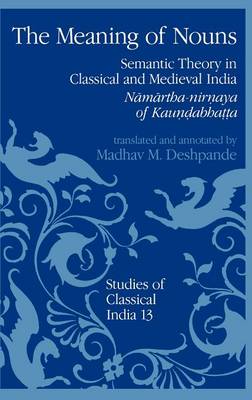Studies of Classical India
1 total work
v. 13
The Meaning of Nouns
Published 30 June 1992
Kaun abhatta's Vaiyakarana-bhusana is a massive work on semantic theory written in India in the 17th century. Kaun abhatta belonged to the tradition of Sanskrit grammar and in this work he consolidated the philosophy of language developed in the Paninian tradition of Sanskrit grammar. Kaun abhatta's work takes account of the philosophical debate which occurred in classical and medieval India among the philosophers and grammarians from about 500 B.C. to the 17th century A.D. Kaun abhatta's work primarily represents this debate between the traditions of Sanskrit grammar, Mi amsa, and Nyaya-Vaisesika. It discusses ontological, epistemological, and exegetical issues concerning the notion of meaning as it relates to the various components of language. The present book is a heavily annotated translation of the Namartha-nirnaya section of Kaun abhatta's Vaiyakarana-bhusana, with an extensive introduction.
While there are several books that discuss Indian semantic theories in general terms, this book belongs to a small class of intensive, focused studies of densely written philosophical texts which examines each argument in its historical and philosophical context. It is of interest to all students of philosophy of language in general, and to students of Indian philosophy in particular.
While there are several books that discuss Indian semantic theories in general terms, this book belongs to a small class of intensive, focused studies of densely written philosophical texts which examines each argument in its historical and philosophical context. It is of interest to all students of philosophy of language in general, and to students of Indian philosophy in particular.
